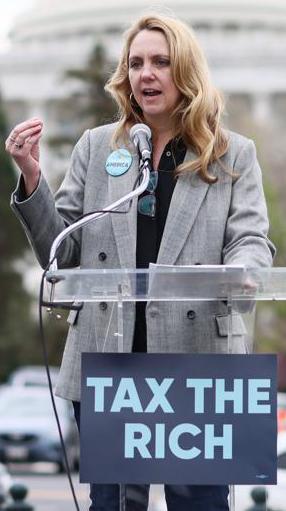WASHINGTON — When Massachusetts voters in 2022 approved the so-called millionaires tax to raise income tax rates on the ultra-wealthy, it was a watershed moment for taxation, not just in the Commonwealth but nationwide. Now, some of the leaders behind that successful effort are hoping to replicate that strategy at the federal level.
As they work to block Republicans’ efforts to slash spending and extend the 2017 tax cuts, the coalition of advocates is also looking to wage a broader campaign to transform the way taxes are viewed politically in this country.
And they’re not just targeting Republicans. As the Democratic Party faces significant backlash from voters who want their leaders to fight harder against President Trump, the progressive groups are hoping to persuade the party to hold the line against the tax cuts for the long haul.
Kristen Crowell, executive director of the organizing group Fair Share America and a key leader from the “millionaires tax’’ campaign, said this year’s fight was as much about being able to effectively communicate the issue with voters as it was about stopping the actual bill.
“Yes, [Republicans] have a trifecta, they will likely be able to do what they want to do, [but] if we don’t fight this fight and come out stronger and more galvanized and clear about the tax code being the terrain we need to fight these fights on — to me, that is the opportunity,’’ Crowell said.
Fair Share America, which echoes the name of the Fair Share Amendment that enshrined the Massachusetts “millionaires tax’’ in the state constitution, is a coalition of state-based and national progressive groups and labor unions founded last year.
Crowell, who started her political career in Wisconsin, said the unsuccessful effort she led to oust the state’s former Republican governor Scott Walker was her epiphany moment. Watching Walker use the budget to limit collective bargaining in the state convinced her that progressives couldn’t cede the tax debate to business groups and wonks if they wanted to grow the proverbial pie and achieve policy wins.
“I’m, like, obsessed about it, because [tax policy] is the single most effective way to deliver, in my opinion, the government that we want and that our families rely on,’’ Crowell said.
Now, she believes, the moment is ripe on the federal level. Much of Trump and Republicans’ 2017 tax cuts will expire at the end of this year, and the party is looking to extend them as part of a multitrillion-dollar package that will also seek at least $1.5 trillion in spending cuts, according to a framework Republicans advanced earlier this month. Though the specifics have yet to be written, those cuts will likely have to come from entitlement programs like food stamps and Medicaid, though Republicans say they’re focused on curtailing waste, fraud, and abuse.
Crowell and her partners are hoping to apply the lessons of Massachusetts to fight that bill and the tax cut extension.
Those who worked on the campaign for the “millionaires tax,’’ a 4 percent surtax on income earned over $1 million, list a few keys to success. One was raising a lot of money — they actually out-raised the pro-business opponents of the bill, $27 million to $14 million — to get their campaign up on the air early and through Election Day. Another was connecting the tax fight to people’s lives, to better schools, transportation, and roads and bridges. The tax has already generated billions of dollars in revenue beyond projections and is being put toward the MBTA and free community college, wins the group now touts as proof of their success. And they talked about the need for fairness, emphasizing that it was about ensuring the very wealthiest pay their share, not raising taxes for low- and middle-income people.
Shanique Rodriguez, now the executive director of the civil rights and economic justice advocacy group Massachusetts Voters Table, led the “millionaires tax’’ campaign effort to message and organize in Black and Indigenous communities and other communities of color. She said a key piece of a pro-tax messaging strategy needs to be casting taxes as good for individuals.
“People look at taxes as if it‘s a punishment in your paycheck,’’ Rodriguez said. “If you want to have free public education, the only way to pay for that is if we all put a little money into that. If you want free hospitals, the only way we pay for that is if we put a little money into that.’’
The strategy was already in action earlier this month in Washington. A slate of Democratic lawmakers including Representative Katherine Clark of Massachusetts, the second-highest-ranking Democrat in the House, addressed a rally organized by Fair Share and its partners. As bundled-up rally-goers waved signs like “No tax cuts for billionaires’’ and “Protect Medicaid,’’ Clark led them in chanting “Hell no’’ to the idea of slashing entitlements and lowering taxes for the wealthy.
Some, though, have their doubts that replicating the Massachusetts blueprint is wise for the nation or for the party.
Representative Seth Moulton of Massachusetts called leaning into progressive populism “great for Democrats if we want to continue losing,’’ arguing instead for more pro-patriotism centrists like himself. He feared the “millionaires tax’’ backers are over-interpreting their close victory. (The amendment passed 52 percent to 48 percent.)
“I think the proponents will just look at it as a success because they got it passed, but they alienated a lot of people, and they ought to be smarter about how they go about this,’’ Moulton said. “All millionaires and billionaires aren’t evil, just like all poor people aren’t evil, and when you instigate class warfare, as opposed to just making the case that everyone should pay their fair share, I don’t think it‘s the best way to win.’’
Paul Craney, executive director of the conservative-leaning Massachusetts Fiscal Alliance, said his group and others in the pro-business coalition argued that the “millionaires tax’’ could encourage the wealthy and business leaders to leave the Commonwealth for lower tax states like New Hampshire or Florida. Indeed, Massachusetts has one of the nation’s highest rates of residents moving away, though that exodus has slowed post-pandemic. He sees the state as a cautionary tale.
“If you live in Massachusetts, you really want your congressional delegation to put partisan politics aside and renew the Tax Cuts and Jobs Act from 2017, because if they don’t, it will result in smaller take-home pay, loss of jobs, and less investment in business,’’ Craney argued.
Crowell says the tax proponents are “not so naive’’ about their chances of stopping the tax bill with Republicans in charge. But her ultimate goal isn’t this battle, it‘s the fight itself.
“If we do not compete in their terrain, which is the tax code, we can’t win the visions that we want to deliver,’’ Crowell said. “There has been a lack of investment. The only way to shift that is if regular people understand what‘s at stake in the tax code.’’
Tal Kopan can be reached at tal.kopan@globe.com. Follow her @talkopan.


